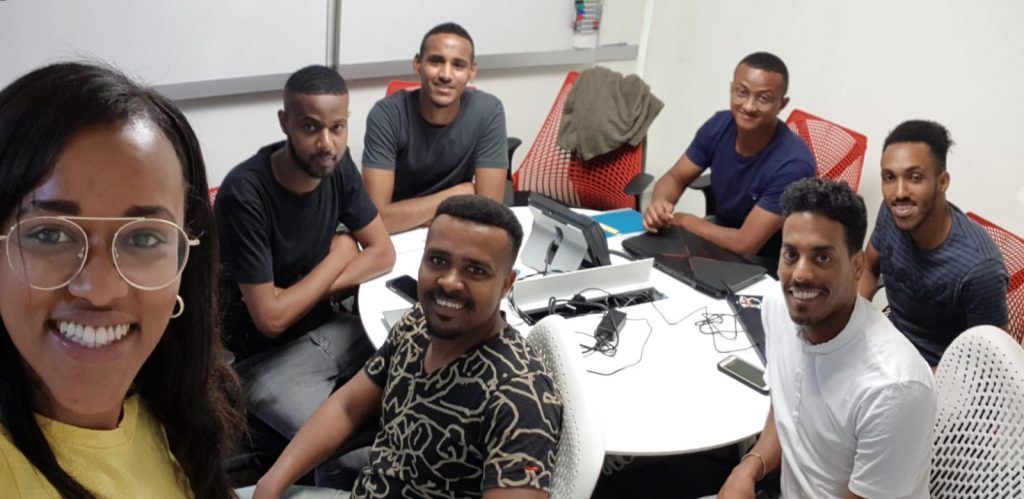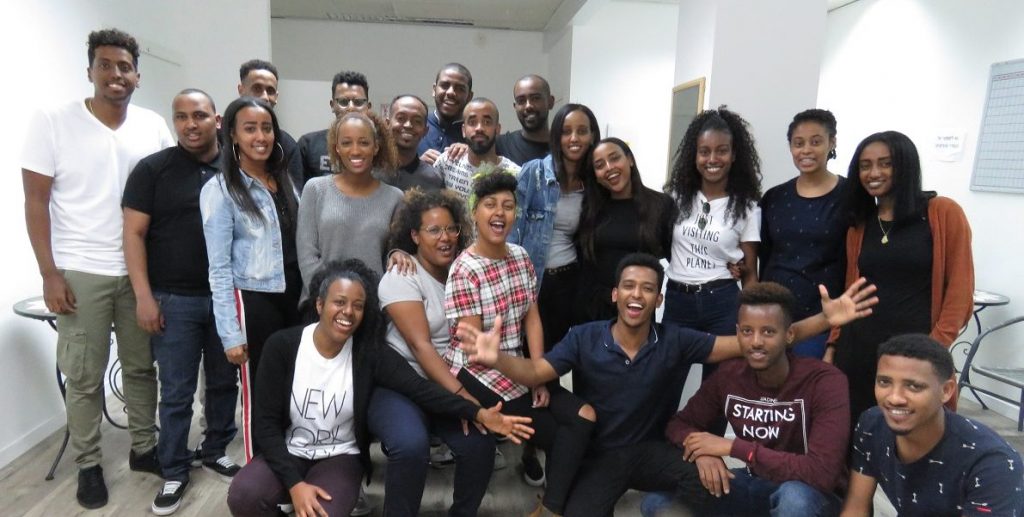The Israeli tech sector is largely considered to be the backbone for the country’s economy, accounting for some 40 percent of Israel’s total exports annually and employing about eight percent of the working population.
For many Israelis from the Ethiopian community, however, the high-tech industry remains largely out of reach due to several factors including educational gaps, socio-economic hardships, and systematic discrimination.
To help shift this reality, Tech-Career, an Israeli NGO established by and for Ethiopian-Israelis, has worked to help members of the community achieve sustainable professional careers in Israel’s high-tech workforce by implementing a comprehensive model of professional technical training programs.
SEE ALSO: Seven Israeli Companies Selected To Head State-Funded Coding Boot Camps
Since the Lod-based organization was founded in 2002, Tech-Career says it has trained over 700 students in its 17-year history and more than 550 graduates from its courses have passed international certification exams, later joining leading high-tech companies such as IBM, Wix, Oracle, AT&T, Intel, and Amdocs to become part of Israel’s successful startup ecosystem.

Tech-Career’s model includes five steps: a 10-month professional high-tech training program post-army service, international certification exams that comply with the national professional training curriculum, a career development program, and placement in suitable professional positions. A fifth step involves volunteering and involvement, enabling future leaders to give back to their community.
This year, Tech-Career added shorter training programs and more companies for internships, final projects, and future placement such as Check Point Software, Facebook, Palo Alto Networks, and eBay.
Tech-Career presents “a great opportunity for the Ethiopian community in Israel to break into the world of high-tech,” Yehudit Metoko, a student currently completing a program to become a QA engineer tells NoCamels. “I don’t know if I would have had this opportunity otherwise.”
The NGO says that in addition to achieving socio-economic mobility, the young graduates can serve as a bridge between Israel and an emerging African market. Israel’s current startup ecosystem is teeming with innovation, investments, and resources and, combined with Ethiopian-Israelis’ local knowledge and understanding of the various needs of the African market, the country can tap into a world of possibilities.
This spring, Tech-Career partnered with African Tech Got Next (ATGN), a global series of panel events on African tech entrepreneurship and the continent’s digital revolution, for an event called “Bridging The Gap Between the Ethiopian-Israeli Community and the African Tech Market.”
The event, held at the offices of eBay Israel in Netanya, was part of a two-day hackathon hosted by Tech-Career to showcase its graduates’ entrepreneurial mindset, discuss the engineering of local solutions to Africa’s challenges, and prepare the Ethiopian-Israeli workforce to tap into African tech industries as well as offer solutions for social issues that affect the Ethiopian-Israeli community, according to a statement by the organization.

ATGN was founded by venture capitalist Noel Daniel and Anthony Worku, an Ethiopian-American tech entrepreneur and social innovator, under the New York-based Kudu Ventures VC umbrella, to connect tech innovators, investors, executives, and entrepreneurs for discussions on how to leverage Africa’s potential to become an innovation engine in the global tech ecosystem.
Daniel and Worku served as panelists at the hackathon, offering their perspectives on Africa’s digital renaissance, with the world’s fastest-growing mobile telecom market, and the role Ethiopian-Israeli tech professionals could play in the industry.
“As the first Ethiopian VC, we are committed to investing and engaging with innovators in the Ethiopian-Israeli community,” Daniel said in a statement.
Worku began working with Israel’s Tech-Career three years ago to promote the full economic integration of Ethiopian-Israelis in the tech industry. He told the audience at the event that entering the Ethiopian market was “not about leaving your home, Israel is your home, but tech companies are made valuable by customers….Ethiopia has almost 120 million people, and you can create one product and reach millions of customers. Think of the market potential in Ethiopia and the continent in Africa in general.”
Alongside his Israel-co-founder Ran Hassid, Worku is the CEO of Africa-focused enterprise resource planning software BeeZ Social ERP, mobile-forward enterprise networking platform BizDate and disruptive youth storytelling platform Plan3000.
“I believe tech is the biggest equalizer,” Worku tells NoCamels.
The Ethiopian community in Israel
Tech may be the biggest equalizer but the Ethiopian community in Israel still faces an uphill battle.
Ethiopian-Israelis make up about 0.01 percent of Israel’s population of some nine million people. They face educational gaps that are narrowing but remain large between them and the general Jewish population, according to a recent report, often barring them from opportunity, exposure, and access to academic and/or training programs.
From a socio-economic perspective, the Israeli-Ethiopian community is also subject to extreme employment segregation and the pay gaps they encounter remain the highest among all the communities examined in the 2018 Diversity Index Report, a comprehensive survey of representation and wage gaps among five underrepresented groups in Israel’s labor market. The document was released this year by Tel Aviv University, the Central Bureau of Statistics, and the Equal Employment Opportunities Commission (EEOC) of the Ministry of Labor, Social Affairs and Social Services.

According to the report, members of the Ethiopian community are not employed at all in certain sectors of the economy, but Ethiopian-Israeli women are overrepresented in certain lower-earning sectors, such as sales and food services. And while employment rates for Ethiopian Israelis have risen over the past six years, income rates remain low — the average net income for an Ethiopian-Israeli household is 40 percent less than that of the average Jewish family in Israel.
The community also faces social hardships rooted in discrimination and police brutality in Israel. Last month, Ethiopian-Israelis held a series of protests across the country against police mistreatment and racism, which they say is rife in Israel. The protests were in response to the death of Solomon Takeh, an unarmed 19-year-old Ethiopian-Israeli who was fatally shot by an off-duty police officer in Kiryat Haim on June 30. The police officer claimed self-defense, saying he was trying to break up a fight and fired at the ground, causing a ricochet that killed Takeh. The incident followed the fatal shooting of 24-year-old Ethiopian-Israeli Yehuda Biadga by police in January.
Sign up for our free weekly newsletter
Subscribe‘Already innovators’
Speaking at the hackathon in May, Worku said the Israeli tech industry needed “to give access to the disadvantaged and tear down the current criteria that overlook the Ethiopian-Israeli community.”
“There needs to be a shift in mindset in the VC community,” said Worku, who observed the lack of Ethiopian-Israeli representation in the tech ecosystem while working on his tech ventures in Israel. “The best problem solvers are those who experience and understand the pain points of a specific target market and expand on them. VCs should realize the value that the marginalized can bring, and seek variations in its entrepreneurial talent supply chain. If the VC’s investment criteria are redesigned, there will be increased investment in brilliant innovative ideas, no matter where they originate.”
Worku says Tech-Career’s Ethiopian-Israelis participants were “already innovators, who are developing creative products with true market potential, especially in the African market.”
The hackathon’s winning projects were both mobile applications that combine Ethiopian cultural practices with innovative tech, offering services that respond to the unique needs of the African population,
The first, BunaTrip, is a travel app that helps locate Ethiopian-founded businesses abroad and Ethiopian families interested in hosting visitors, tapping into an Ethiopian diaspora that numbers over five million.
The second project, Kube, offered a fintech solution to the Ethiopian market. Historically, Ethiopians didn’t use banks for their financial needs. Instead, they had “Kube”, a traditional loan system in the Ethiopian community, where family and friends who held large gatherings manually raised communal funds, ensuring mutual responsibility. The Kube app automates this traditional practice, using technology instead of pen, paper, and written contracts, to manage meetings and funds in an efficient and orderly way through a mobile phone.

Metoko, who was part of the eight-member Kube team, said her family, as well as many other Ethiopian-Israelis, still practiced the system. She tells NoCamels that it is important to help the tradition “move forward in a digital world while also making it accessible to the younger generation” of Ethiopian-Israelis who might not otherwise know much about it
The two winning initiatives were among seven competitors. The teams will embark on an all-expenses-paid trip to Ethiopia in August – sponsored by Kudu Ventures – to introduce their products to the Ethiopia market, receiving mentorship and support for pitching, showcasing, marketing and launching their products for African tech markets.
Worku said he was highly impressed with the teams involved in the hackathon, praising the advanced “level of innovation and ingenuity.” He also hailed the immense talent found among the people in Africa, who he hoped would eventually connect with these project founders and other tech innovators.
“They are creating solutions that solve local problems. It just blew our minds!” he tells NoCamels, adding that hiring people with local understanding was key.
“We believe that if we are creating a product for Africa, we are going to do it through African engineers. We started recruiting earlier this year in January, and we were amazed by the kind of talent existing in Africa at the moment, especially in Ethiopia,” he says in reference to his companies.
“When people talk about Africa they talk about gold and diamonds, but the main resource Africa has is its people,” he adds, “The engineers we have hired from Ethiopia, are as efficient as any others coming from Harvard or MIT. The young generation is well educated, well prepared, has the knowledge and skills. All they need is an opportunity.”
The challenges in the African tech sector
Worku says there are several main issues facing the African tech industry.
The first is that African countries often import foreign, mainly western, technology into its countries and try to fit it into the African market. Worku urges African product innovators and creators to resist emulating foreign technology and instead, try to find solutions from within. An African version of Uber, for example, will not work the same in Kenya as in Ghana, Worku says. “There is no one-fits-all approach.”
A second issue is Africa’s current infrastructure deficit. Africa’s vast infrastructure deficit is a constraint on its growth and most of the investments were in transport (41.7 percent), energy (30.4 percent) and water (16.2 percent). Worku believes technological bridges and investment in communication infrastructure should also be prioritized in Africa.

Another problem is the lack of private investment. Of the $81.6 billion invested in infrastructure, 42.1 percent came from national governments, 23.8 percent came from China, and 24.1 percent came from bilateral donors, multilateral agencies and African institutions. Just 2.8 percent came from the private sector. This shortage of private investment has been a burden for development, but it is also creating an opportunity for investors and corporations to immerse in Africa’s clean market and integrate it into the global economy.
Israel can contribute to addressing these challenges while expanding its own technological capabilities through its tech venture capitalist community, Worku explains.
SEE ALSO: New Initiative Brings Coding Bootcamp To African Refugees In Tel Aviv
“I believe the Israeli VC community has to create a different type of criteria to evaluate their investments in the African market. It’s about understanding what opportunities are there in Africa and how Israeli VCs can capitalize and boot relations between the two regions,” he says.
On the African side, it is crucial to create opportunities and explore new methods to attract foreign investments, Worku says. The Tech-Career hackathon bringing new Ethiopian-Israeli-founded tech to the continent could potentially be the first step in bringing foreign interest and later, foreign capital.
Related posts

Editors’ & Readers’ Choice: 10 Favorite NoCamels Articles

Forward Facing: What Does The Future Hold For Israeli High-Tech?

Impact Innovation: Israeli Startups That Could Shape Our Future




Facebook comments